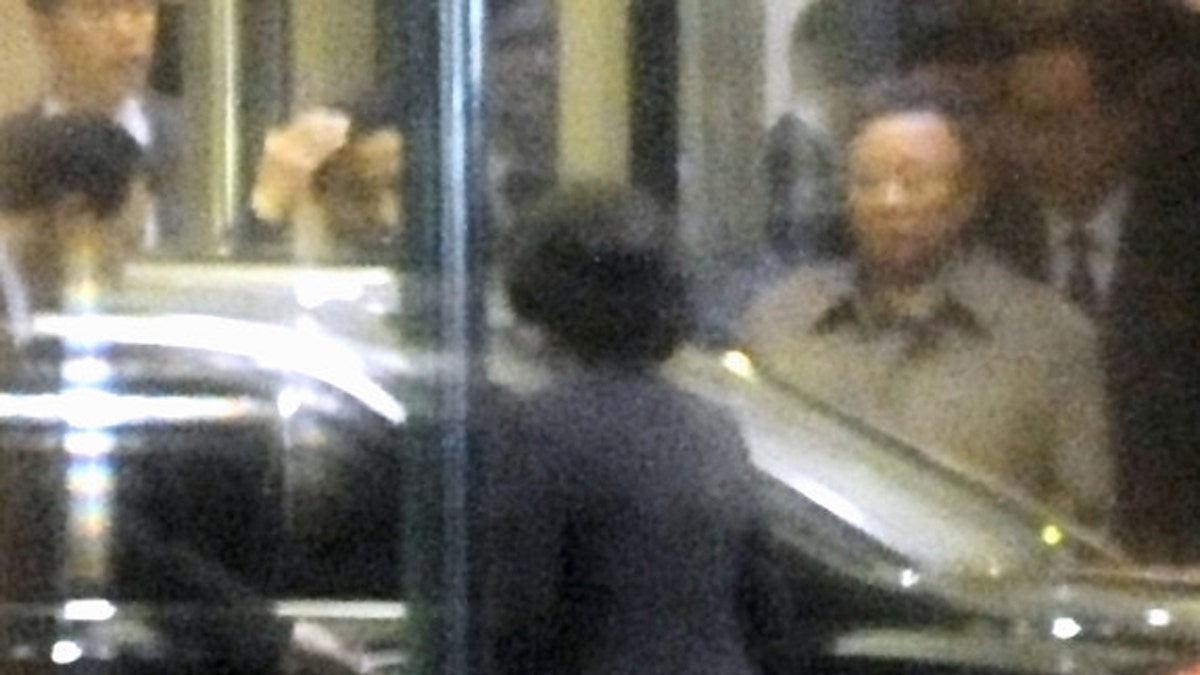
North Korean leader Kim Jong Il, center, leaves a hotel in Mudanjiang in northeastern China Friday afternoon, May 20, 2011. Kim Jong Il, who rarely travels abroad, made an unusual third trip in just over a year Friday to his country's main ally and benefactor, China, news agencies reported. The trip set off a media frenzy because many initially reported it was his son and heir apparent, Kim Jong Un, who had crossed the border, a reflection of the difficulty of getting information from or about North Korea. (AP2011)
Kim Jong Il is on his travels again, according to reports.
There will be no speech at the United Nations or a tour of European capitals like many world leaders tend to do.
Instead, he will visit China again, one of the few communist allies he has left in the world and where he’s sure to get a warm welcome.
Kim certainly knows China is the best place to go if he wants support because if Beijing didn’t keep financing his Stalinist regime it would have likely imploded long ago, as reports suggest it relies heavily on Chinese oil and agricultural imports to keep what lights are still on there and avert people from starving.
This is Kim's third visit to China in just over a year.
And it is reasonable to believe that the reasons for the trip are to keep the aid flowing, try to find a way to mimic China’s economic rise without putting the North Korean regime in peril, and to try to get the U.S. back to the negotiating table on its Nukes.
Kim's luxury armored train is reported to have crossed the border into China Friday, heading to the city of Changchun.
He often stops off at northern Chinese cities on his way to Beijing in an apparent move to try to boost economic ties between the two countries.
North Korea has been trying to get its own special economic zones off the ground now for several years with limited success.
Kim and his entourage are likely to have been pushing to get further Chinese investment, in particular, into its special economic zone in the northern port of Rason.
If Kim is going to get more economic assistance and investment from China then he has to offer something in exchange.
And the only thing he seems to really have to offer at the moment is to stop his country’s aggressive actions against South Korea.
China is, of course in a difficult position with its friend and communist neighbor.
It doesn’t want another shooting war on the Korean peninsula as that would likely disrupt or even derail its own economic development and at the same time bring the U.S. military much nearer to its borders.
But Beijing also isn’t prepared to throw North Korea under the bus, as analysts suggest they don’t want a united Korea, likely to be an American ally on its borders, if that happened.
Kim’s latest trip has gotten very little media coverage by the Chinese. But an editorial in the Communist Party-linked Global Times did pointedly say, "The world now needs to take a very patient and flexible attitude in dealing with North Korea. It is fortunate that there still remains an effective communication channel between China and North Korea".
It also went on to say in reference to U.S. and South Korean policies towards Pyongyang:
“If China were to have put pressure on North Korea as they do, these precious channels might have been cut long ago."
North Korea hasn’t made it easy though for China in recent years.
Nuclear tests, the sinking a South Korean warship and deadly artillery barrages across the frontier have shredded any hope for Seoul’s once highly touted “Sunshine policy” with the North of trying to keep Pyongyang happy with aid, presents and trade.
The U.S. has also been sucked into North Korea’s games of aid for nukes in the past.
Now it seems South Korea and the U.S. speak with one voice towards North Korea.
They are refusing to sit down to six nation talks on dismantling North Korea’s nuclear weapons program until Pyongyang admits responsibility over recent attacks and shows its prepared to negotiate in good faith rather than by nuclear brinkmanship.
Kim is likely to be looking for an improved aid package from China during this trip as reports continue to surface that its economy is shrinking and there is a real danger of people starving again their in the countryside.
China will probably be looking for improved behavior from its troublesome neighbor that could help cool tensions on the Korean peninsular and eventually lead to negotiations on dismantling its nuclear weapons.
Many North Koreans seeking to escape the repressive rule of Kim Jong-il have also made the same trip as him to Beijing.
They didn’t travel in the luxury train “Dear Leader” used for his trip. Instead they had to avoid border guards and the Chinese military to make their way to Beijing.
Many chose in the past to climb the walls of foreign embassies in the Chinese capital to try to get sanctuary and political asylum and eventually get to South Korea via a third country.
In response the Chinese government built huge wire cages around the embassies and beefed up the military presence in the area to dissuade North Korean defectors from trying to get into them.
Kim Jong-Il will have got a much friendlier welcome from the Chinese authorities in Beijing.
But the cost of that friendship could be less talk of war by the North and instead be prepared to negotiate away its nuclear weapons.
